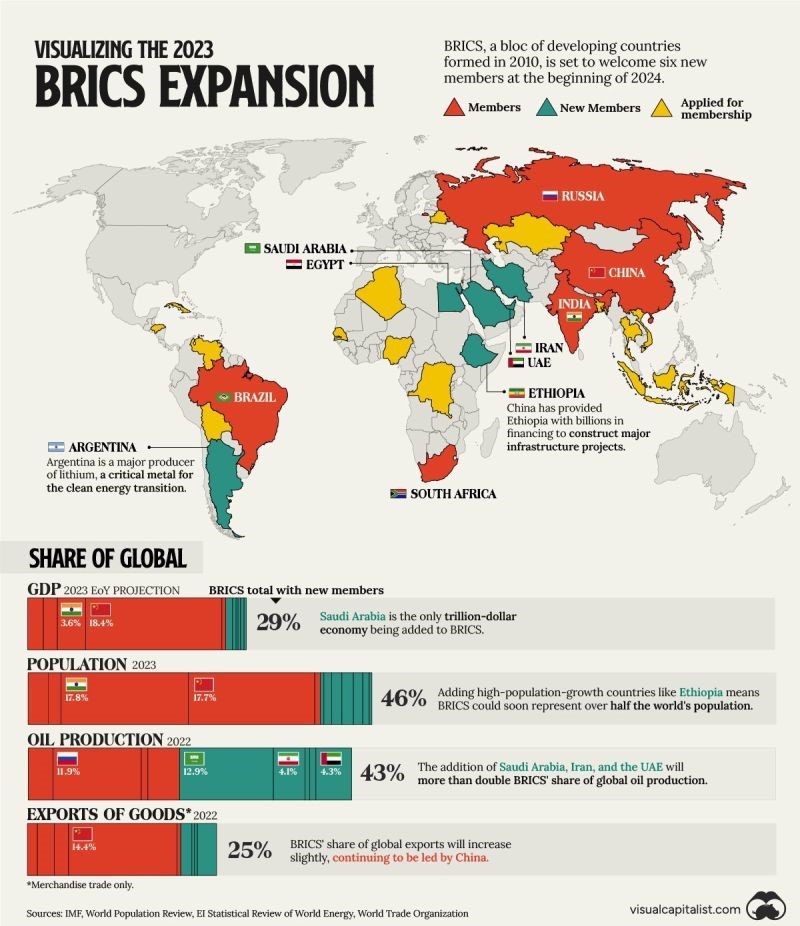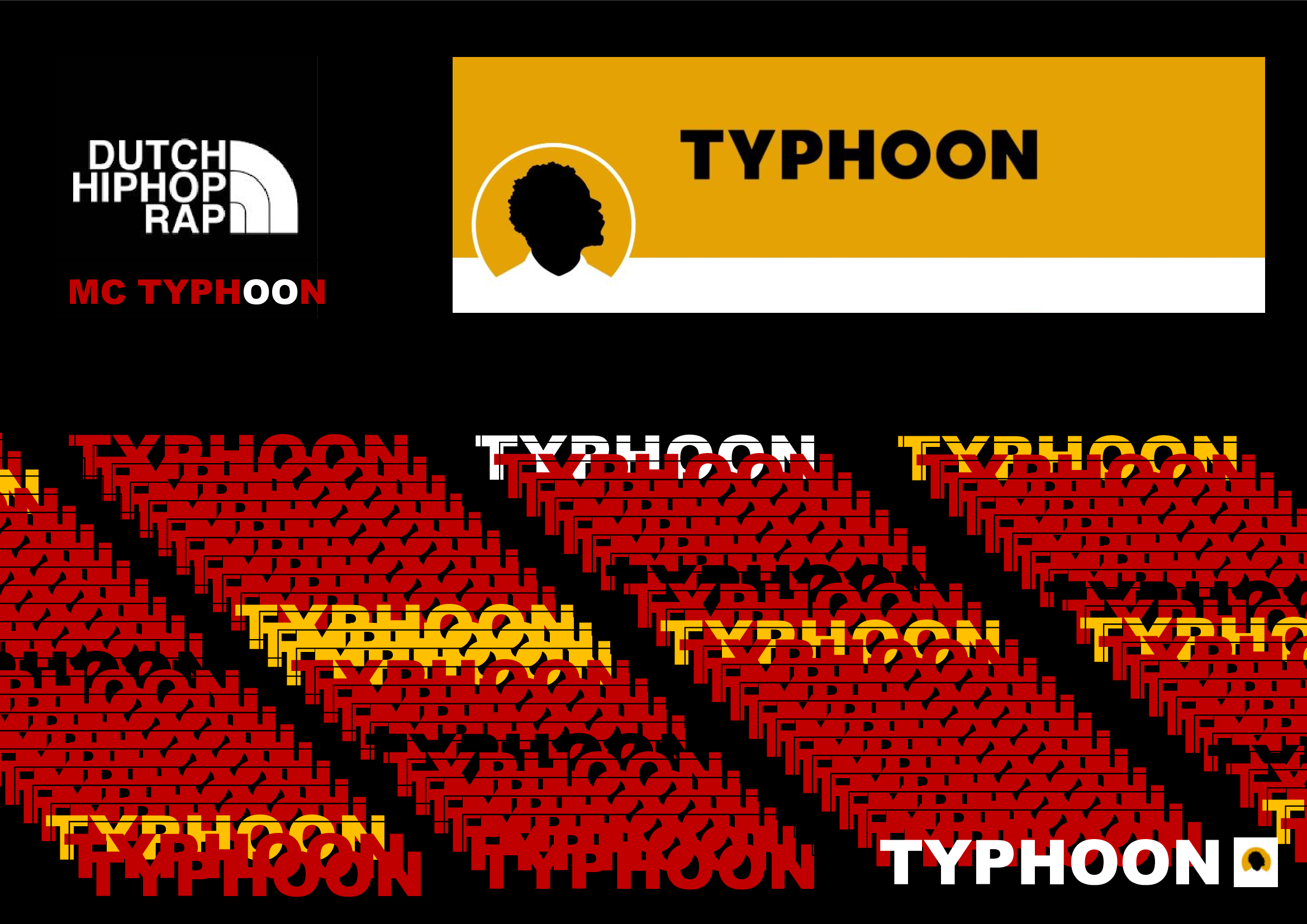-
AutoreMessaggi
-
-
The Expanding
Influence of BRICS:
An Emerging
Counterweight to
the G7:

Abstract:
In recent years, the BRICS bloc—comprising Brazil, Russia, India, China, E Sud Africa—has grown beyond its initial conception as an investment slogan, evolving into a coalition with tangible economic and political clout. As of 2024, BRICS nearly doubled its membership, including significant new additions such as Iran, IL United Arab Emirates, Ethiopia, and Egypt. This paper explores the recent expansion, motivations behind growth, implications for global economics and politics, and the broader challenges that BRICS faces in positioning itself as a counterweight to Western-led institutions like the G7 and the International Monetary Fund (IMF).
Introduzione:
The concept of BRICS originated from a 2001 investment banking proposal aimed at highlighting the growth potential of certain emerging economies: Brazil, Russia, India, China, and later Sud Africa. Over two decades, this collection of nations has evolved from a simple acronym to a cohesive bloc with its own multilateral lending institution and a shared interest in counterbalancing Western dominance in international finance. With its expansion in 2024, BRICS now holds greater promise for reshaping the global power dynamic, positioning itself as a potential counterbalance to the G7 and other Western-led coalitions.
New Members of BRICS: Expansion and Strategic Implications.
In early 2024, BRICS formally included Iran, the United Arab Emirates, Ethiopia, E Egitto as new members, and Saudi Arabia was invited to join, although it has yet to make a final decision on its membership. This expansion incorporates both energy-rich nations, like Iran and the UAE, and resource-diverse countries, which strengthens BRICS as an alliance of major resource producers and high-consumption developing economies. Argentina declined an invitation due to its shift in geopolitical alignment under President Javier Milei, who has prioritized relations with the U.S. over ties to China and Brazil.
Several other nations, including Malaysia, Thailand, E Turkey, have expressed interest in joining BRICS, underscoring the appeal of an alternative coalition to the U.S.-led global order. The continued expansion of BRICS will likely be addressed in the upcoming summit in Kazan, Russia, in late October 2024, a meeting that will shape the organization’s path forward.
Motivations Driving BRICS Expansion.
The expansion of BRICS has been driven by various political, economic, and strategic motives, particularly by China, which is now the foremost industrial power globally. China’s ambition is to bolster its influence by drawing in countries that traditionally align with the United States. South Africa and Russia support this growth initiative, viewing it as a means to amplify BRICS’ international significance. Although India initially expressed concerns that enlargement could amplify China’s dominance within the group, and Brazil was cautious about alienating the West, both countries ultimately agreed to expand membership. For newly admitted members, BRICS offers access to alternative financial resources and a platform distinct from Washington’s influence, adding strategic and diplomatic value to their participation.
The Growing Influence of BRICS as a Global Power Bloc.
The latest BRICS summit in Kazan revealed that the organization, while not yet directly challenging institutions such as the IMF or the U.S. dollar’s preeminence, is gaining significant traction in the international sphere. A major diplomatic win for BRICS was the attendance of UN Secretary-General Antonio Guterres, as well as Turkish President Tayyip Erdogan, leader of a NATO member state. This participation signals growing recognition of BRICS as a legitimate, if not rival, force in global governance. Furthermore, the summit provided an opportunity for India and China to showcase efforts to strengthen bilateral ties, potentially reinforcing BRICS as a cohesive unit despite internal differences.
Russian President Vladimir Putin, who hosted the summit in Kazan, used the event to counter Western narratives portraying Russia as increasingly isolated following economic sanctions over its actions in Ukraine. This gathering, attended by leaders representing nearly half of the global population, highlighted BRICS’ potential to bridge connections between emerging economies and challenge Western-led economic structures.
Challenges and Future Directions for BRICS.
Despite its growing influence, BRICS faces numerous challenges in achieving parity with Western-led organizations. Although the group has indicated a desire to establish alternative mechanisms for trade and payment systems, the summit’s final communique revealed a gap between ambition and concrete actions. The absence of specific strategies for bypassing Western-dominated financial frameworks, such as the dollar-dependent SWIFT system, underscores the bloc’s hurdles in reshaping global economic systems.
Moreover, some analysts, such as Alicia Garcia-Herrero of the Bruegel economic think tank, argue that Western powers have yet to fully appreciate BRICS’ emerging importance, risking a miscalculation in global strategy. While the Kazan summit may not rival the historical impact of the 1944 Bretton Woods conference, where Allied powers shaped a post-war economic order, it signifies a critical step in BRICS’ evolution.
Conclusione:
The recent expansion of BRICS marks a significant milestone in the bloc’s development from an economic alliance into a strategic counterweight to the G7 and similar Western-led institutions. As BRICS prepares for further enlargement and explores new frameworks for international trade and finance, it has the potential to reshape global power structures. However, the bloc must overcome numerous challenges, including balancing internal dynamics and translating diplomatic rhetoric into actionable economic frameworks. With its growing membership and collective clout, BRICS stands poised to influence the international order in ways previously unattainable for emerging economies.
-
The recent expansion of BRICS represents a powerful shift in the global economic landscape, highlighting the increasing influence of emerging economies in shaping international order.
By adding new members, including energy-rich nations and regional powerhouses, BRICS has bolstered its potential as a formidable counterweight to Western-dominated coalitions like the G7. This growth emphasizes the importance of economic diversity and resilience, particularly for developing countries that seek alternative financing and trade mechanisms less dependent on the dollar.
The inclusion of key players like the UAE, Iran, and potentially Saudi Arabia, strengthens BRICS’ role as an alliance capable of promoting multipolarity in international relations and creating a platform that respects the distinct needs and interests of its member countries.
This expansion could facilitate a more balanced and equitable global economy, fostering cooperation on shared challenges like sustainable development, trade, and regional stability.
-
@africamonetary, While BRICS’ expansion suggests ambition, the alliance faces significant obstacles to its effectiveness as a global counterweight.
The group’s lack of a coherent economic or political strategy has made it challenging to deliver concrete alternatives to Western-dominated systems like the IMF or dollar-based trade networks. Despite its growing membership, BRICS is still limited by internal divisions, with China’s overwhelming influence, and divergent interests among members making cohesive decision-making difficult.
The absence of a clear framework for trade and payment mechanisms indicates that BRICS may be more aspirational than operational. Moreover, the coalition’s expansion has not clarified its purpose beyond offering a vague alternative to Western influence, raising doubts about whether it can actually achieve its goal of reshaping the global economic order or if it will remain largely symbolic.
-
@genztalks, Interesting perspective.
The approach by BRICS highlights the unique value of diversity within the alliance and the gradual, measured approach it is taking to reshape the global economic order. While BRICS countries may have diverse economic models and political interests, this diversity can actually enhance the coalition’s adaptability and relevance. The differences among member states allow BRICS to appeal to a wider array of developing nations, thereby fostering a genuinely multipolar and inclusive alternative to Western-dominated frameworks.
Note: The European Union also experienced this gradual evolution [from the European Coal and Steel Community (ECSC) in 1951, followed by the European Economic Community (EEC) and so on] – with internal conflicts leading up to BREXIT!
-
I will also add that BRICS’ cautious approach to establishing independent trade and payment mechanisms can be seen as prudent rather than a lack of strategic coherence. Instead of rushing into rigid frameworks, BRICS has laid the groundwork for a long-term vision that supports financial sovereignty for member nations, which has the potential to evolve into a sustainable model. Recent discussions around de-dollarization and alternative trading mechanisms, while still developing, indicate that BRICS is actively pursuing ways to increase its members’ economic autonomy from Western structures, especially important in the wake of geopolitical tensions.
-
-
AutoreMessaggi
Devi essere loggato per rispondere a questo argomento.









